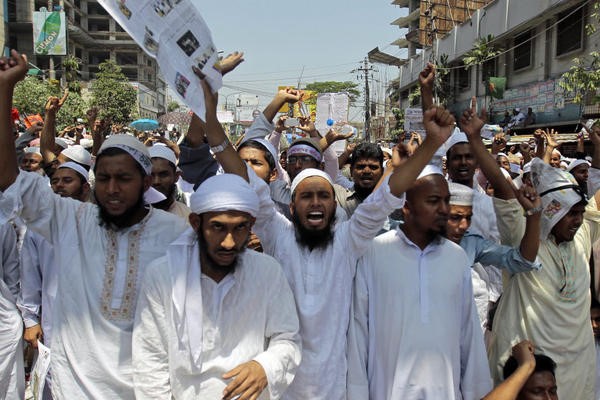 The serving Bangladesh Army Colonel and one of his former bosses, a retired Major General, hold a common view—the rise of Hifazat-e-Islam, the new radical Islamist force in the country, will definitely impact the impending national elections and may even cause the defeat of the ruling Awami League of Prime Minister Sheikh Hasina.
The serving Bangladesh Army Colonel and one of his former bosses, a retired Major General, hold a common view—the rise of Hifazat-e-Islam, the new radical Islamist force in the country, will definitely impact the impending national elections and may even cause the defeat of the ruling Awami League of Prime Minister Sheikh Hasina.
Seen as a front of the Jamaat-e-Islami, a party banned by the Supreme Court from contesting the coming elections, the Hifazat could fill the space created by the Jamaat. The Jamaat is in the dock with the Awami League regime in Dhaka cracking down on its leaders on charges of war crimes during the 1971 liberation struggle.
Is Hifazat, backed by the Jamaat, an ally of the Opposition Bangladesh National Party (BNP)?
The Jamaat may have been barred from contesting the polls but continues to be an ally of the BNP, and, therefore, the doubts. But, things are not that simple. One school of thought believes Hifazat was propped up by none other than the Awami League to counter the Jamaat. Whatever the case may actually be, Hifazat, led from its headquarters in Chittagong by the 93-year-old cleric, Ahmad Shafi, (also the chairman of the Bangladesh Qaumi Madrassah Education Board that oversees all such schools across the country) is the new force that can spin the poll verdict.
If Hifazat comes to dictate the poll verdict, considering the clout that the Deoband (in India) educated Ahmed Shafi enjoys, it is likely the BNP would win the polls. In that case, the BNP will have both the Jamaat and the Hifazat on its side. If this is not alarming enough from India’s point of view, what is more disturbing are reports that the Awami League, too, is trying to get the Hifazat on its side by removing differences, a charge the ruling party strongly denies.
It is disturbing because the Hifazat came to the limelight in April-May this year when it took out huge rallies, including one in downtown Dhaka, to highlight its 13-point demand, which primarily wants Bangladesh to follow Shariat laws. Besides, the Hifazat wants punishment for all the leaders of the largely youth-based Shabaag movement that has been calling for a more secular society and death penalty for those involved in widespread killing and rape during the liberation war.
What does a regime change in Dhaka mean for India, particularly bordering states like Assam or Northeast India as a whole? It may not have an impact overnight, but the manner in which the Awami League Government of Sheikh Hasina cracked down on terror and radical Islamist groups could suddenly become history. In the past five years, since the Awami League won the election in 2008, cooperation from Dhaka in tackling trans-border insurgency has actually changed the insurgency discourse in the Northeast, particularly Assam.
Insurgent leaders belonging to groups like the United Liberation Front of Asom (ULFA), National Democratic Front of Bodoland (NDFB), United National Liberation Front (UNLF), Kamatapur Liberation Organisation (KLO) and others have been handed over to India even in the absence of an extradition treaty. And yes, if anti-talk ULFA leader Paresh Baruah has had to exit the safe confines of Bangladesh and live a relatively hard life along the China-Myanmar border today, it is because of Dhaka’s tough action against him. In fact, detained ULFA general secretary, Anup Chetia, too, could soon be handed over to India by Dhaka.
Will Sheikh Hasina move closer to Hifazat due to electoral expediency? Well, Sheikh Hasina is now accusing the BNP of trying to make a comeback with the help of forces such as the Hifazat, indicating that the Awami League will not have any truck with the new radical group in the block. Winning the polls in Bangladesh, of course, is a different ball game. On her part, BNP chief Khaleda Zia is known to let her party go to any length in arousing anti-India passions to suit its electoral prospects, and, therefore, does not surprise most people in India.
In fact, Khaleda Zia had once told this writer during an interview at the height of ULFA insurgency that she regards ULFA cadres as ‘freedom fighters’ much like the Mukti Bahini. But, what if Sheikh Hasina’s Awami League were to concede some of the Hifazat’s 13 points, purely keeping the polls in view? In fact, Sheikh Hasina had already met a Hifazat team ahead of its April 6 rally and said her government had already met some of the group's 13 demands.
Police in Bangladesh have arrested some bloggers whom the Hifazat described as ‘atheists’, and a home ministry committee has taken a close look at remarks the Hifazat considers anti-Islamic. Are we reading too much into these actions by Dhaka? The silver lining, of course, is that Sheikh Hasina has drawn a lot of flak from groups pushing secularism in Bangladesh. Yes, India should be keenly watching the Bangladesh poll verdict and its fallout.
Courtesy : Institute of Peace and Conflict Studies (http://www.ipcs.org)